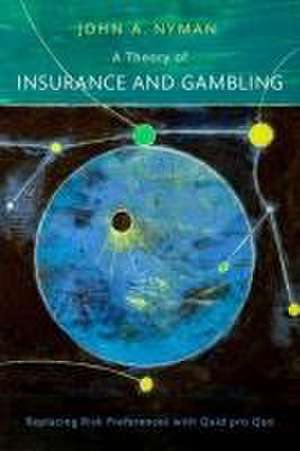A Theory of Insurance and Gambling: Replacing Risk Preferences with Quid pro Quo
Autor John A. Nymanen Limba Engleză Hardback – 22 mar 2024
Preț: 370.87 lei
Preț vechi: 510.74 lei
-27% Nou
Puncte Express: 556
Preț estimativ în valută:
70.99€ • 77.14$ • 59.67£
70.99€ • 77.14$ • 59.67£
Carte disponibilă
Livrare economică 20-26 martie
Preluare comenzi: 021 569.72.76
Specificații
ISBN-13: 9780197687925
ISBN-10: 019768792X
Pagini: 272
Dimensiuni: 226 x 163 x 36 mm
Greutate: 0.5 kg
Editura: Oxford University Press
Colecția OUP USA
Locul publicării:New York, United States
ISBN-10: 019768792X
Pagini: 272
Dimensiuni: 226 x 163 x 36 mm
Greutate: 0.5 kg
Editura: Oxford University Press
Colecția OUP USA
Locul publicării:New York, United States
Recenzii
Why do we insure...and gamble? John Nyman has a novel and compelling perspective. Forget risk; think about what influences the value of income. The implications are wider and deeper than you might expect. This is an important contribution.
Nyman's A Theory of Insurance and Gambling builds on his groundbreaking analysis of the demand for and welfare effects of health insurance, extending it to insurance in general and to unidentified parallels between the demand for insurance and the demand for gambling. In each area he provides a compelling critique of conventional theories, grounded in empirical evidence, while offering alternative models and insights that align with both intuition and evidence. This is an important book for anyone interested in insurance and gambling.
Nyman's A Theory of Insurance and Gambling builds on his groundbreaking analysis of the demand for and welfare effects of health insurance, extending it to insurance in general and to unidentified parallels between the demand for insurance and the demand for gambling. In each area he provides a compelling critique of conventional theories, grounded in empirical evidence, while offering alternative models and insights that align with both intuition and evidence. This is an important book for anyone interested in insurance and gambling.
Notă biografică
John A. Nyman is Professor Emeritus of Health Policy and Management in the School of Public Health at the University of Minnesota. His over 150 research articles include important analyses of topics as diverse as: the effect of excess demand on the quality of nursing home care, the need for consistency in cost-effectiveness analyses, the effectiveness of health promotion programs in the workplace, the impact of attrition bias in the RAND Health Insurance Experiment, and alternative explanations for the St. Petersburg paradox and the gambler's fallacy. In addition to these, he is the author of a number of research articles on insurance and gambling, and the book, The Theory of Demand for Health Insurance (Stanford University Press, 2003).
